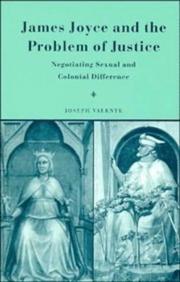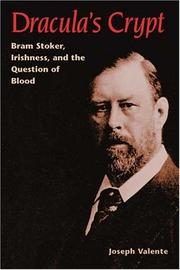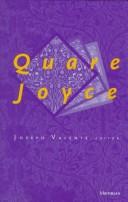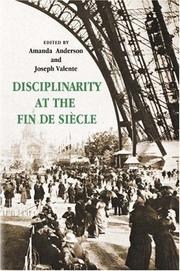| Listing 1 - 10 of 16 | << page >> |
Sort by
|

ISBN: 0521473691 0521110459 0511553773 Year: 1995 Publisher: Cambridge Cambridge University Press
Abstract | Keywords | Export | Availability | Bookmark
 Loading...
Loading...Choose an application
- Reference Manager
- EndNote
- RefWorks (Direct export to RefWorks)
This is the first full-length study of James Joyce to subject his work to ethical and political analysis. It addresses important issues in contemporary literary and cultural studies surrounding problems of justice, as well as discussions of gender, homosociality and the colonial condition. Valente uses an original theory and psychology of justice through which to explore both the well-known and the more obscure of Joyce's works. He traces the remarkable formal and stylistic evolution that defined Joyce's career, and his progressive attempt to negotiate the context of social difference in racial, colonial, class and sexual terms. By analysing Joyce's verbal strategies within both the psychobiographical and sociohistorical contexts, Valente unlocks the politics of Joyce's unconscious and reveals the legacy of Western political thought.
Sociology of literature --- Joyce, James --- Colonies in literature. --- Imperialism in literature. --- Justice in literature. --- Literature and society --- Political fiction, English --- Race in literature. --- Sex role in literature. --- History --- History and criticism. --- Joyce, James, --- Criticism and interpretation. --- Arts and Humanities --- Literature --- Joyce, James Augustine Aloysius --- Dzhoĭs, Dzheĭms Avgustin Aloiziĭ --- Džoiss, Džeimss --- Gʻois, Gʻaims --- Joyce, Giacomo --- Jūyis, Jīms --- Tzoys, Tzaiēms --- Tzoys, Tzeēms --- Джойс, Джеймс --- Джойс, Джеймс Августин Алоїсуїс --- Zhoĭs, Zheĭms --- ג׳ויס, ג׳ײמס, --- ג׳ויס, ג׳יימס, --- ジョイス --- ジェームスジョイス,

ISBN: 0252026969 9780252026966 Year: 2002 Publisher: Urbana: University of Illinois press,
Abstract | Keywords | Export | Availability | Bookmark
 Loading...
Loading...Choose an application
- Reference Manager
- EndNote
- RefWorks (Direct export to RefWorks)
National characteristics, Irish, in literature. --- Horror tales, English --- Dracula, Count (Fictitious character) --- Vampires in literature. --- Blood in literature. --- History and criticism. --- Stoker, Bram, --- Knowledge --- Ireland. --- Ireland --- In literature. --- Dracula, Count (Fictitious character). --- Blood in literature --- National characteristics, Irish, in literature --- Vampires in literature --- History and criticism --- Stoker, Abraham, --- סטוקר, בראם, --- 斯托克布拉姆, --- Horror tales, English - History and criticism. --- Stoker, Bram, - 1847-1912. - Dracula. --- Stoker, Bram, - 1847-1912 - Knowledge - Ireland. --- Ireland - In literature. --- Stoker, Bram, - 1847-1912
Book
ISBN: 1282959603 9786612959608 0252090322 9780252090325 9780252035715 9781282959606 0252035712 Year: 2011 Publisher: Urbana, Ill. : University of Illinois Press,
Abstract | Keywords | Export | Availability | Bookmark
 Loading...
Loading...Choose an application
- Reference Manager
- EndNote
- RefWorks (Direct export to RefWorks)
Men --- Masculinity --- Irish literature --- Masculinity in literature. --- Masculinity (Psychology) --- Sex (Psychology) --- Masculinity (Psychology) in literature --- Human males --- Human beings --- Males --- Effeminacy --- Psychological aspects. --- History and criticism. --- Masculinity in literature --- History and criticism --- Psychological aspects --- Psychology.

ISBN: 0472108980 Year: 1998 Publisher: Ann Arbor, Mich. University of Michigan Press
Abstract | Keywords | Export | Availability | Bookmark
 Loading...
Loading...Choose an application
- Reference Manager
- EndNote
- RefWorks (Direct export to RefWorks)
Book
Year: 1994 Publisher: Tulsa University of Tulsa
Abstract | Keywords | Export | Availability | Bookmark
 Loading...
Loading...Choose an application
- Reference Manager
- EndNote
- RefWorks (Direct export to RefWorks)

ISBN: 0691089620 0691227551 0691089612 9780691089621 Year: 2002 Publisher: Princeton Princeton university press
Abstract | Keywords | Export | Availability | Bookmark
 Loading...
Loading...Choose an application
- Reference Manager
- EndNote
- RefWorks (Direct export to RefWorks)
Contemporary celebrations of interdisciplinary scholarship in the humanities and social sciences often harbor a distrust of traditional disciplines, which are seen as at best narrow and unimaginative, and at worst complicit in larger forms of power and policing. Disciplinarity at the Fin de Siècle questions these assumptions by examining, for the first time, in so sustained a manner, the rise of a select number of academic disciplines in a historical perspective. This collection of twelve essays focuses on the late Victorian era in Great Britain but also on Germany, France, and America in the same formative period. The contributors--James Buzard, Lauren M. E. Goodlad, Liah Greenfeld, John Guillory, Simon Joyce, Henrika Kuklick, Christopher Lane, Jeff Nunokawa, Arkady Plotnitsky, Ivan Strenski, Athena Vrettos, and Gauri Viswanathan--examine the genealogy of various fields including English, sociology, economics, psychology, and quantum physics. Together with the editors' cogent introduction, they challenge the story of disciplinary formation as solely one of consolidation, constraint, and ideological justification. Addressing a broad range of issues--disciplinary formations, disciplinarity and professionalism, disciplines of the self, discipline and the state, and current disciplinary debates--the book aims to dislodge what the editors call the "comfortable pessimism" that too readily assimilates disciplines to techniques of management or control. It advances considerably the effort to more fully comprehend the complex legacy of the human sciences.
Universites --- Litterature anglaise --- Universities and colleges --- English literature --- Programmes d'etudes. --- Histoire et critique --- Theorie, etc. --- Curricula --- History and criticism --- Theory, etc. --- Grossbritannien --- Great Britain. --- Grande-Bretagne --- Great Britain --- Histoire --- Vie intellectuelle --- History --- Intellectual life --- 19th century --- Annual Reports (Bosanquet). --- Anti-Machiavel (Frederick the Great). --- Arnold, Thomas. --- Bhagavadgita. --- Boas, Franz. --- Bosanquet, Bernard. --- Butler, Judith. --- Carlyle, Thomas. --- Charlotte, Princess. --- Cornhill. --- Dictionary (Bailey). --- Dowden, Edward. --- Ebbinghaus, Hermann. --- Edinburgh Review. --- Erasmus. --- Filostrato (Boccaccio). --- Fraser's Magazine. --- Fukuyama, Francis. --- Giddings, Franklin. --- Goffman, Erving. --- Heart of Darkness (Conrad). --- Heretics (Chesterton). --- Hubert, Henri. --- Jackson, Hughlings. --- Jowett, Benjamin. --- Kant, Immanuel. --- Kuklick, Henrika. --- Leenhardt, Maurice. --- Leopold, Prince. --- Louis XV. --- Meacham, Standish. --- Morris, William. --- News from Nowhere (Morris). --- Oeconomies royales (Sully). --- On Liberty (Mill). --- Pater, Walter. --- Pawde, Kumud. --- Planck, Max. --- Popular Science Monthly. --- Quesnay, François. --- Revue Philosophique. --- Réville, Albert. --- Sartor Resartus (Carlyle). --- Tennyson, Lord Alfred. --- Troilus (Chaucer). --- Vincent, Samuel. --- Voltaire. --- Weber, Max. --- Wright, Chauncey. --- Zunz, Olivier. --- de Senancour, Etienne. --- Theory, etc
Book
Abstract | Keywords | Export | Availability | Bookmark
 Loading...
Loading...Choose an application
- Reference Manager
- EndNote
- RefWorks (Direct export to RefWorks)
Book
ISBN: 026808176X 9780268081768 9780268011208 0268011206 0268207216 Year: 2014 Publisher: Notre Dame, Indiana : University of Notre Dame Press,
Abstract | Keywords | Export | Availability | Bookmark
 Loading...
Loading...Choose an application
- Reference Manager
- EndNote
- RefWorks (Direct export to RefWorks)
"In Yeats and Afterwords, contributors articulate W. B. Yeats's powerful, multilayered sense of belatedness as part of his complex literary method. They explore how Yeats deliberately positioned himself at various historical endpoints-of Romanticism, of the Irish colonial experience, of the Ascendancy, of civilization itself-and, in doing so, created a distinctively modernist poetics of iteration capable of registering the experience of finality and loss. While the crafting of such a poetics remained a constant throughout Yeats's career, the particular shape it took varied over time, depending on which lost object Yeats was contemplating. By tracking these vicissitudes, the volume offers new ways of thinking about the overarching trajectory of Yeats's poetic engagements. Yeats and Afterwords proceeds in three stages, involving past-pastness, present-pastness, and future-pastness. The first, "The Last Romantics," examines how Yeats repeats classic motifs and verbal formulations from his literary forebears in order to express the circumscribed cultural options with which he struggles. The essays in this section often uncover Yeats's relation to sources and precursors that are surprising or have been relatively neglected by scholars. The second section, "Yeats and Afterwords," looks at how Yeats subjects his own past sentiments, insights, and styles to critical negation, crafting his own afterwords in various ways. The last section, "Yeats's Aftertimes," explores how, thanks to the stature Yeats achieved through its invention, his style of belatedness itself comes to be reiterated by other writers. Yeats is a towering figure in literary history, hard to follow and harder to avoid, and later writers often found themselves producing words that were, in some sense, his afterwords. "This is a groundbreaking collection that will have a major impact on Yeats studies and will be useful for scholars working more broadly in Irish and modernist studies." -Rob Doggett, SUNY Geneseo"--
POETRY / English, Irish, Scottish, Welsh. --- LITERARY CRITICISM / European / English, Irish, Scottish, Welsh. --- Yeats, W. B. --- Yeats, William Butler --- D. E. D. I., --- Daemon Est Deus Inversus, --- Ganconagh, --- I., D. E. D., --- Йейтс, У. Б. --- Ĭeĭts, U. B. --- Йейтс, Уильям Батлер, --- Ĭeĭts, Uilʹi︠a︡m Batler, --- Weilian Batele Yezhi, --- Yeṭs, Ṿilyam Baṭler, --- יטס, יטלאם בטלר --- ייטס, ויליאם בטלר, --- 威廉,巴特勒,叶芝, --- Criticism and interpretation.
Book
ISBN: 1839981016 1839981024 1839981008 Year: 2022 Publisher: London, UK : Anthem Press,
Abstract | Keywords | Export | Availability | Bookmark
 Loading...
Loading...Choose an application
- Reference Manager
- EndNote
- RefWorks (Direct export to RefWorks)
Inspired by the work of Margot Norris, this volume takes up her theme of how James Joyce's works open up a host of new possibilities: for interpretation, for stylistic "iridescence," for narrative, for other possible worlds, and for gender equality.
Literature --- Authors --- History and criticism.
Book
ISBN: 9781839981012 9781839981005 Year: 2023 Publisher: London Anthem Press
Abstract | Keywords | Export | Availability | Bookmark
 Loading...
Loading...Choose an application
- Reference Manager
- EndNote
- RefWorks (Direct export to RefWorks)
| Listing 1 - 10 of 16 | << page >> |
Sort by
|

 Search
Search Feedback
Feedback About UniCat
About UniCat  Help
Help News
News